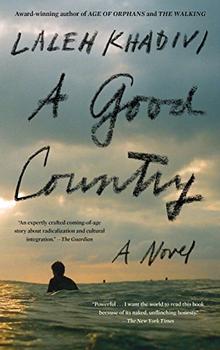Summary | Excerpt | Reviews | Beyond the book | Read-Alikes | Genres & Themes | Author Bio

The Association of Small Bombs is a fictional story that revolves around an actual 1996 car bombing at a New Delhi market which killed 13 and injured 30. Deepa and Vikas Khurana's two young sons are caught up in the blast and killed instantly, while the boys' best friend Mansoor, is wounded by shrapnel. The novel follows the individuals whose lives are impacted by this horrific event through to the present, including not only Deepa, Vikas and Mansoor, but others these people touch through association – including Shockie, a Kashmiri terrorist who built and detonated the bomb.
The first half focuses on the Khuranas, Mansoor and Mansoor's parents Afsheen and Sharif, exploring the immediate aftermath of "A small bomb. A typical bomb. A bomb of small consequence." The author vividly captures the shock, confusion and disbelief associated with an event of this nature. Mansoor wanders, so rattled he's unable to even call home, and the four adults scour the hospitals and the market looking for their children.
Also well-drawn and believable is Mahajan's depiction of how the Khuranas process what has happened, over the ensuing months and weeks, as each gets lost in "what-ifs." The Khuranas keep recalling how their boys acted or looked as they contemplate their now empty house. Each parent wishes for death and subconsciously seeks it out, and it's only when they form an organization to help other victims of tragedy — The Association of Small Bombs — that they are able to repair their marriages and absolve themselves of blame. This section of the book is heartfelt and contemplative; there's not much action, but the emotional depth is profound.
The novel's momentum picks up as Mansoor becomes a young man and strives to find reason behind the blast that impacted his life so completely and to understand the people responsible for it. The story gradually steers away from his activities, however, focusing more on his friend Ayub, a fellow Muslim and the head of a group trying to obtain justice for those arrested and tortured for the bombing without evidence pointing to their involvement.
As Mansoor's and Ayub's lives intertwine, the author illustrates one possible avenue a seemingly well-meaning and good person might travel to become involved in acts of violence. Like the first half of the narrative, this latter section is littered with insightful observations, although they're no longer the grief-stricken contemplations of those in mourning, but instead focus on religious and political discussions. At one point, for example, Shockie and his associates discuss how a bombing is meant to disrupt the fiscal system, not to kill. "Plant enough bombs," one opines, "and you create uncertainty in the economy and investment dries up."
...People say 9/11 was the worst terror attack of all time – was it? I think the small bombs that we hear about all the time, that go off in unknown markets, killing five or six, are worse. They concentrate the pain on the lives of a few..." The way he said it, without irony, was frightening. But there was something idealistic about his flat exhortation...he had the unaffected unshowy confidence of a young man who has dedicated himself to a difficult way of life. As a master terrorist, he no longer saw the strangeness of what he did or how he talked about killing.
Ayub marvels how a "group of men, gathered in a warm, dark room, could alter the political future of a country." The perspectives are both realistic and frightening as acts of murder and destruction are coolly contemplated.
I was somewhat frustrated by the pacing, particularly throughout the first half, eager for something to happen and to move beyond the many aspects of grief described. It would have been helpful to know in advance that as the book progresses, the survivors' pain recedes into the background and the story becomes more about how that ache can have far-reaching consequences.
I also found some of the rationale embraced by those responsible for the bombings to be illogical at times. I'm not a young male, a victim, a minority or a resident of an impoverished city, so my ability to relate to the bombers is certainly limited. Nevertheless, an author should be able to help readers understand unfamiliar points of view, and while exceptionally successful in achieving this in the first half, l I felt his efforts fell a bit short toward the end. The novel also takes readers' knowledge of issues in India such as the ongoing tensions between its Hindu and Muslim communities for granted, and the narrative could benefit from more context for Western readers.
The Association of Small Bombs will likely find an audience in those who like well-written literary fiction set in today's India. Book groups in particular will find much to discuss given its complex and timely themes of grief and terrorism.
![]() This review
first ran in the May 18, 2016
issue of BookBrowse Recommends.
This review
first ran in the May 18, 2016
issue of BookBrowse Recommends.

If you liked The Association of Small Bombs, try these:

by Laleh Khadivi
Published 2018
A timely novel about the radicalization of a Muslim teen in California - about where identity truly lies, and how we find it.

The Ministry of Utmost Happiness
by Arundhati Roy
Published 2018
A dazzling, richly moving new novel by the internationally celebrated author of The God of Small Things.
Your guide toexceptional books
BookBrowse seeks out and recommends the best in contemporary fiction and nonfiction—books that not only engage and entertain but also deepen our understanding of ourselves and the world around us.